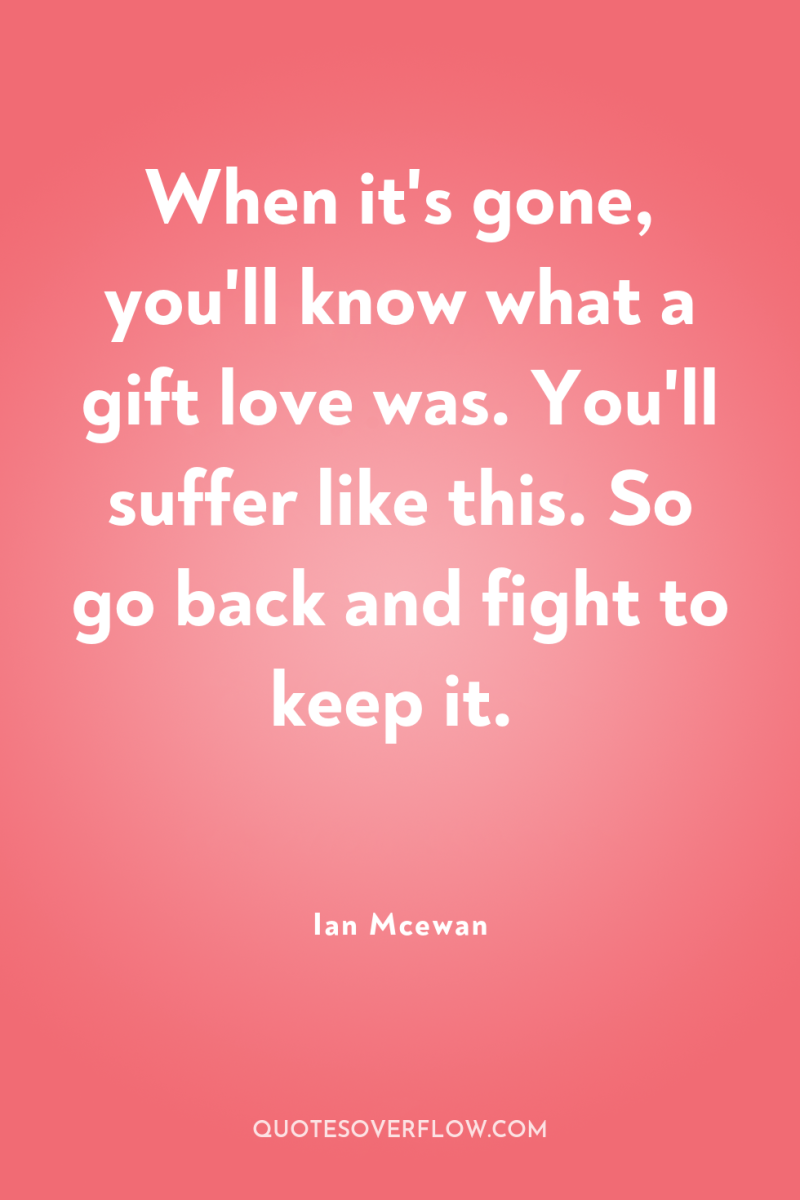
1
When it's gone, you'll know what a gift love was. You'll suffer like this. So go back and fight to keep it.Ian Mcewan
2
The anticipation and dread he felt at seeing her was also a kind of sensual pleasure, and surrounding it, like an embrace, was a general elation--it might hurt, it was horribly inconvenient, no good might come of it, but he had found out for himself what it was to be in love, and it thrilled him.Ian Mcewan
3
Finally he spoke the three simple words that no amount of bad art or bad faith can every quite cheapen. She repeated them, with exactly the same slight emphasis on the second word, as though she were the one to say them first. He had no religious belief, but it was impossible not to think of an invisible presence or witness in the room, and that these words spoken aloud were like signatures on an unseen contract.Ian Mcewan
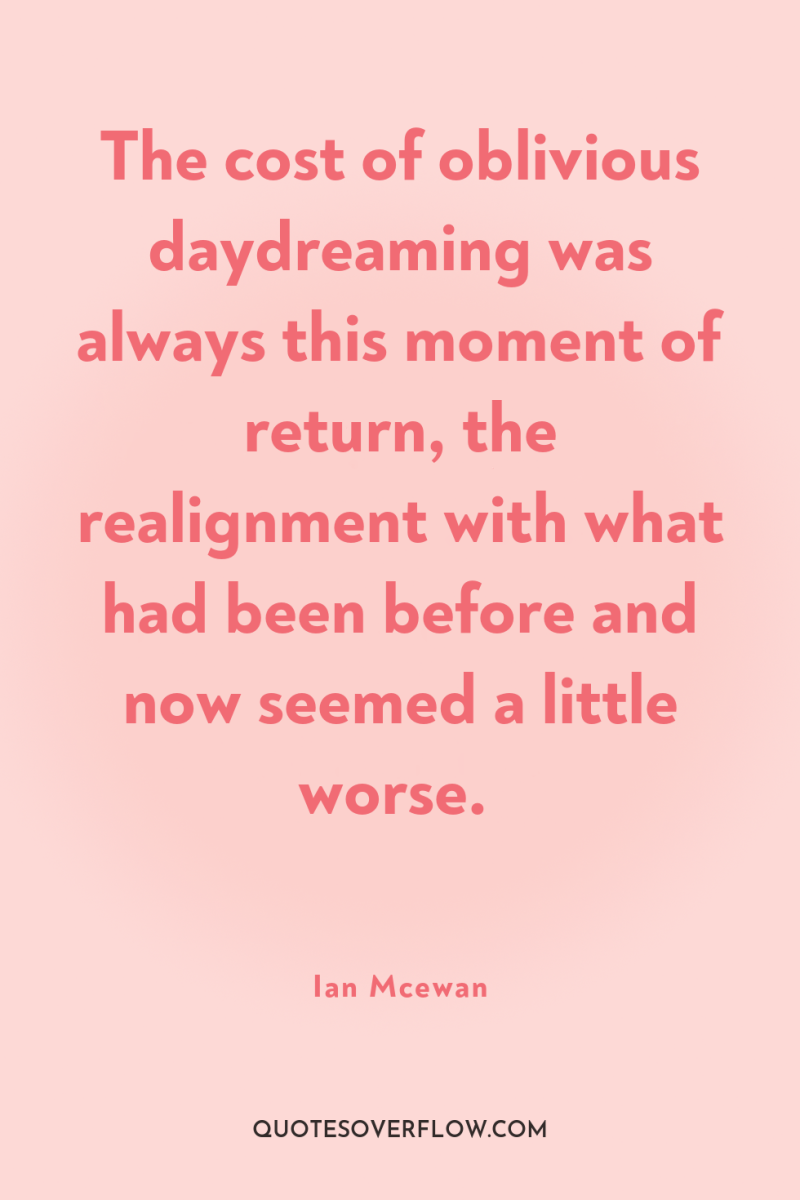
4
The cost of oblivious daydreaming was always this moment of return, the realignment with what had been before and now seemed a little worse.Ian Mcewan
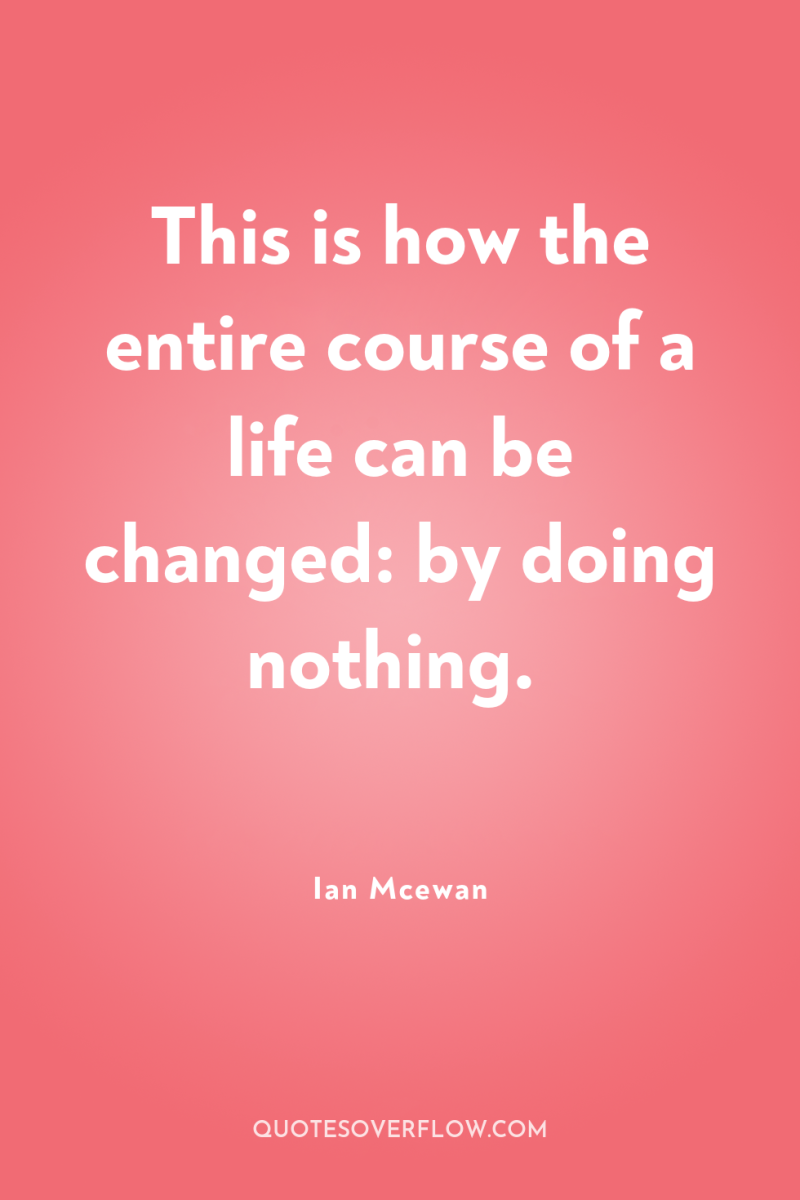
5
This is how the entire course of a life can be changed: by doing nothing.Ian Mcewan
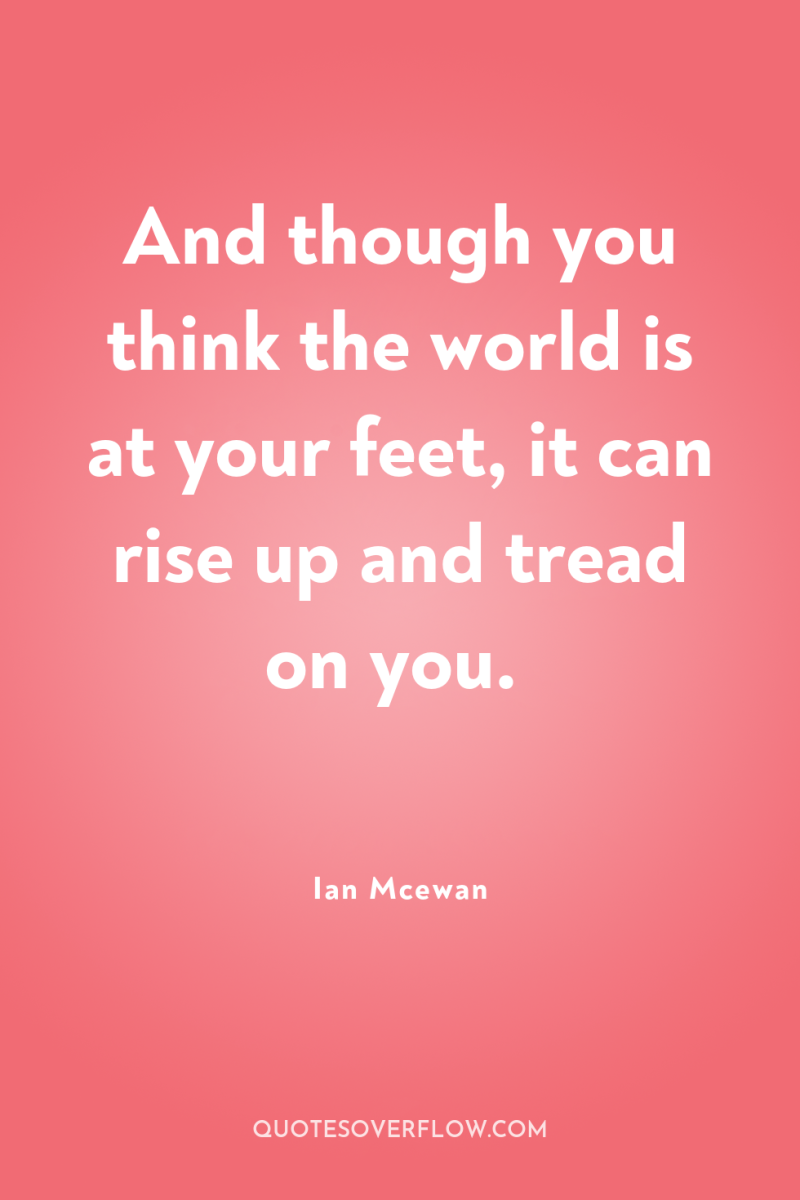
6
And though you think the world is at your feet, it can rise up and tread on you.Ian Mcewan
7
If life was a dream, then dying must be the moment when you woke up. It was so simple it must be true. You died, the dream was over, you woke up. That's what people meant when they talked about going to heaven. It was like waking up.Ian Mcewan
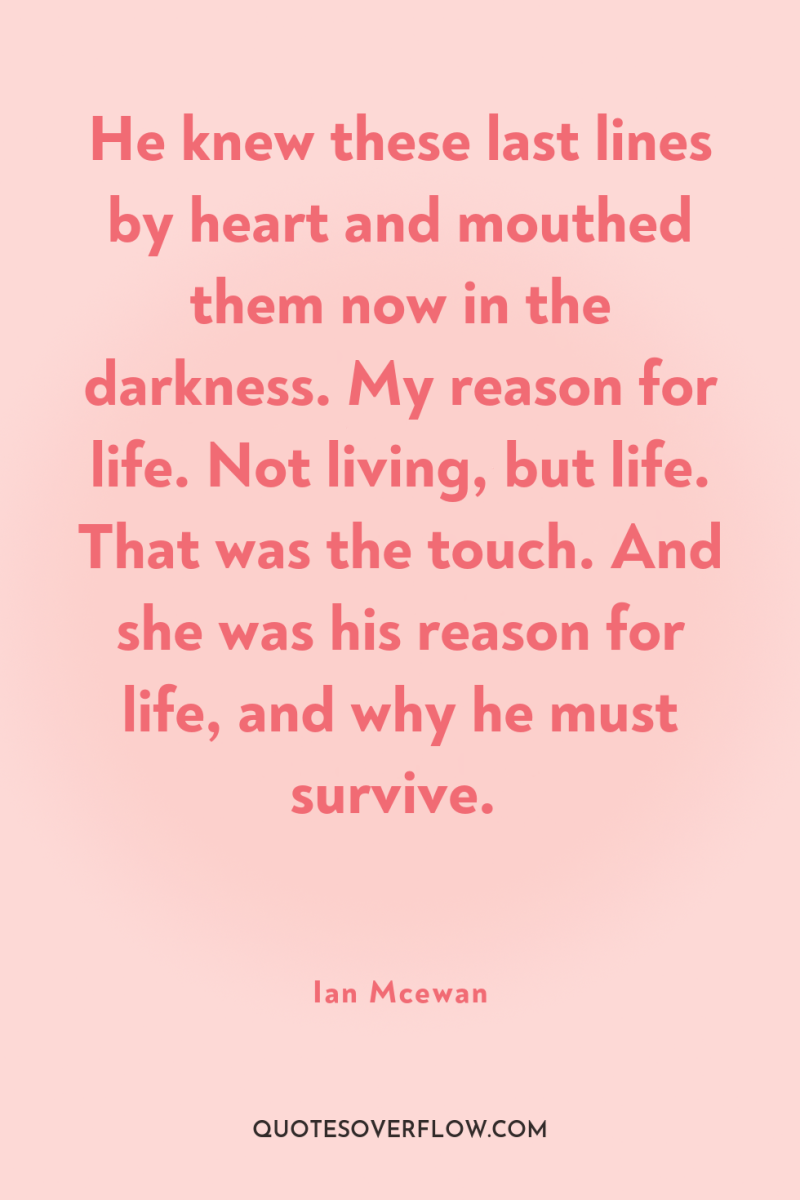
8
He knew these last lines by heart and mouthed them now in the darkness. My reason for life. Not living, but life. That was the touch. And she was his reason for life, and why he must survive.Ian Mcewan
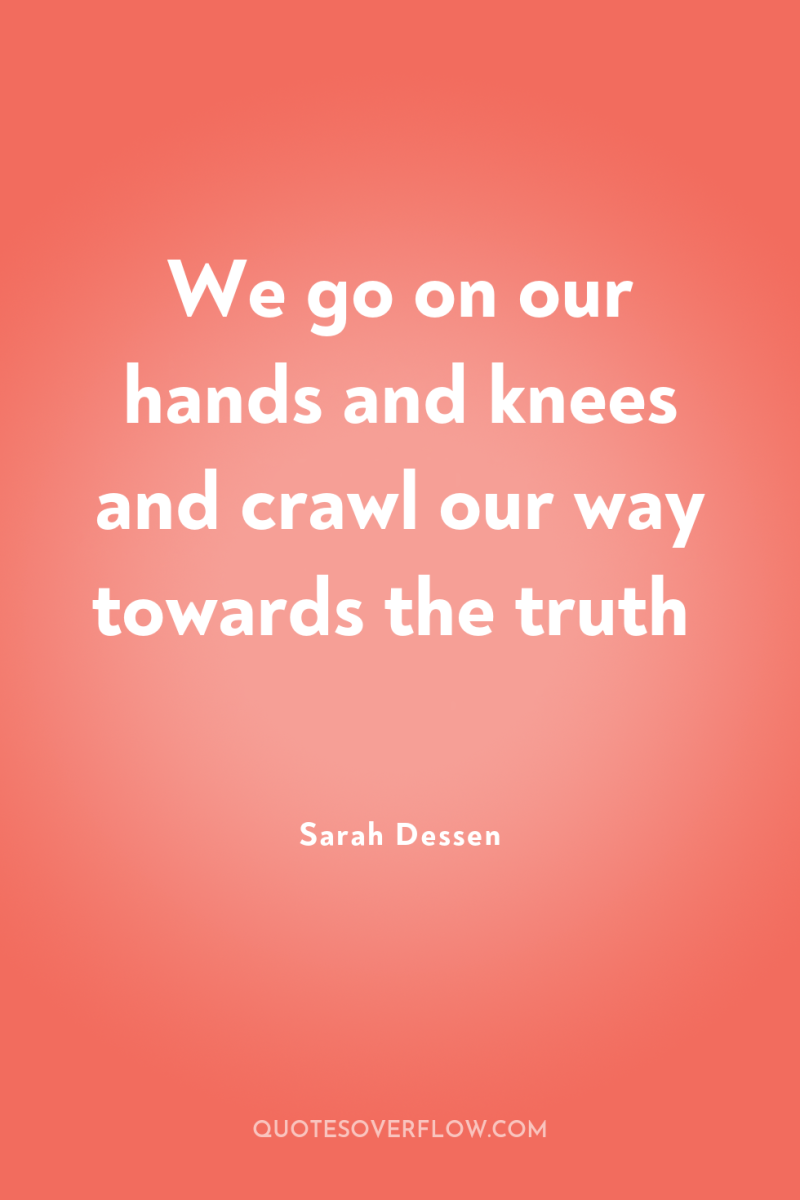
9
We go on our hands and knees and crawl our way towards the truthIan Mcewan
10
There's a taste in the air, sweet and vaguely antiseptic, that reminds him of his teenage years in these streets, and of a general state of longing, a hunger for life to begin that from this distance seems like happiness.Ian Mcewan
11
Everyone knew as much as they needed to know to be happy.Ian Mcewan
12
Above all, she wanted to look as though she had not given the matter a moment's thought, and that would take time.Ian Mcewan
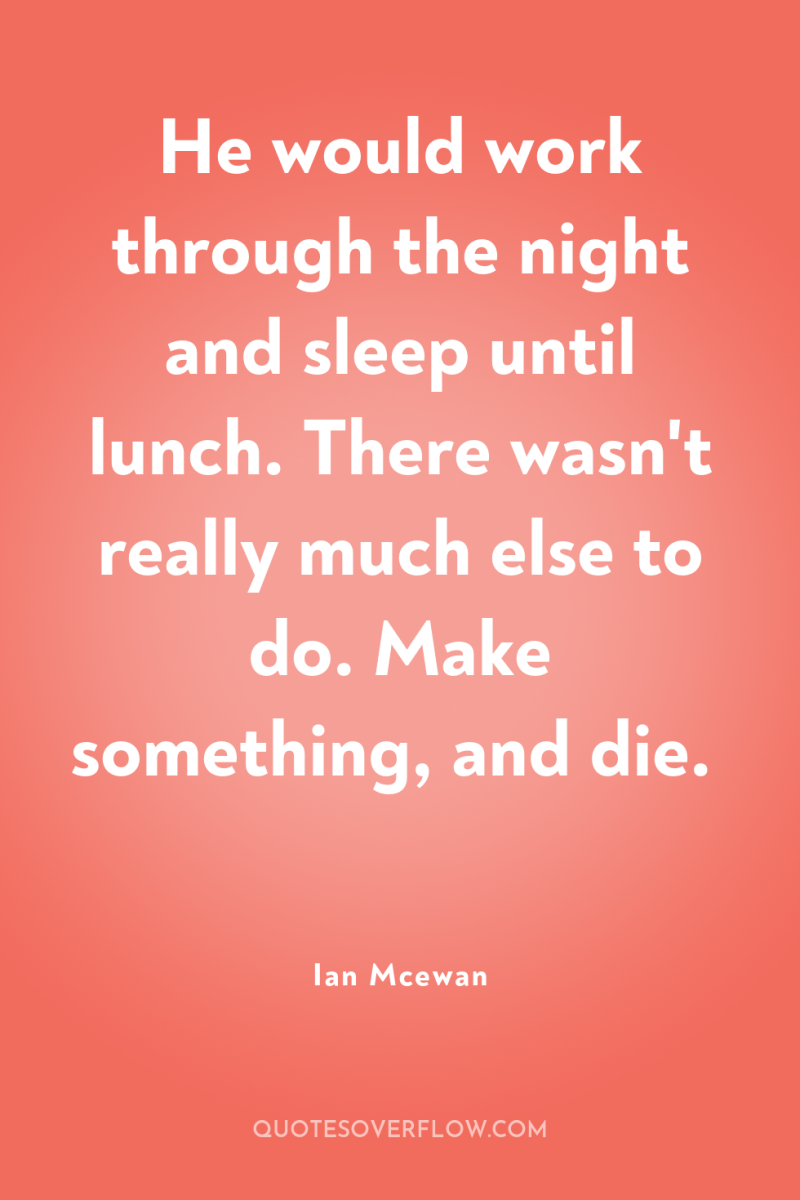
13
He would work through the night and sleep until lunch. There wasn't really much else to do. Make something, and die.Ian Mcewan
14
He saw it for the first time: on the day he died he would be wearing unmatching socks, there would be unanswered e-mails, and in the hovel he called home there would still be shirts missing cuff buttons, a malfunctioning light in the hall, and unpaid bills, uncleared attics, dead flies, friends waiting for a reply and lovers he had not owned up to.Ian Mcewan
15
A story was a form of telepathy. By means of inking symbols onto a page, she was able to send thoughts and feelings from her mind to her reader's. It was a magical process, so commonplace that no one stopped to wonder at it.Ian Mcewan
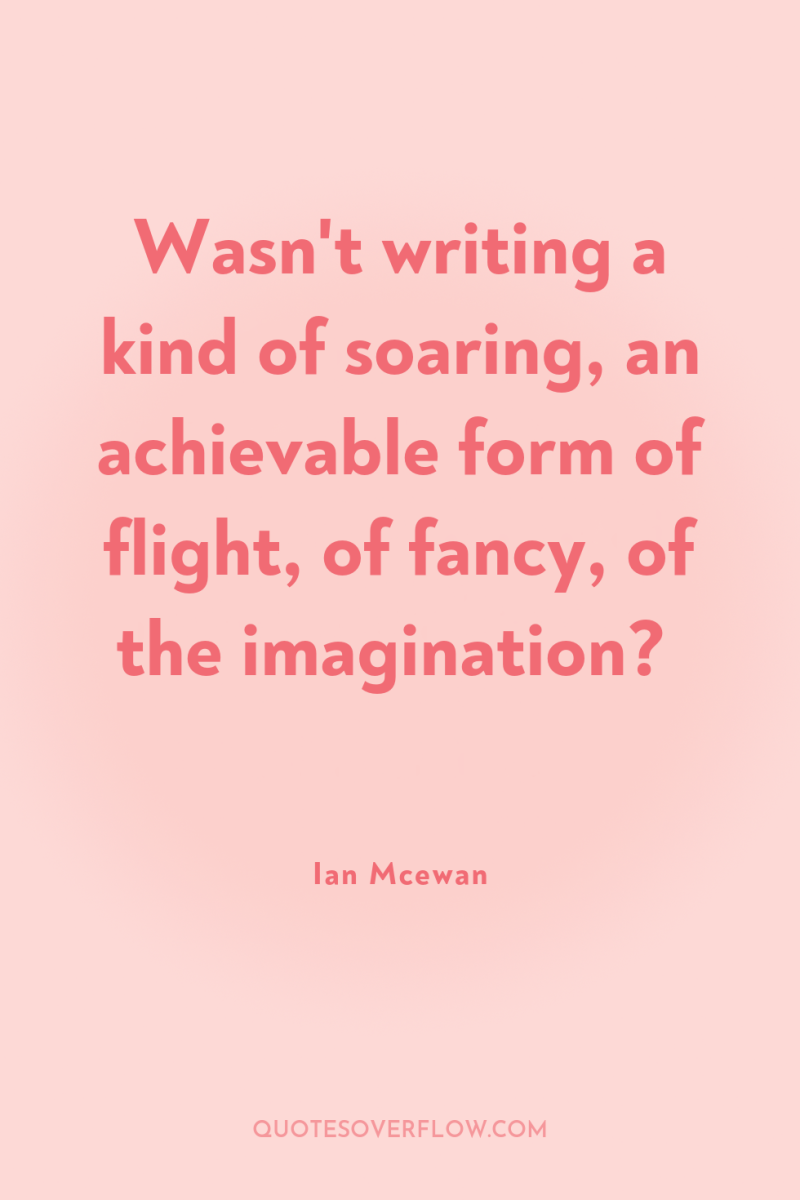
16
Wasn't writing a kind of soaring, an achievable form of flight, of fancy, of the imagination?Ian Mcewan
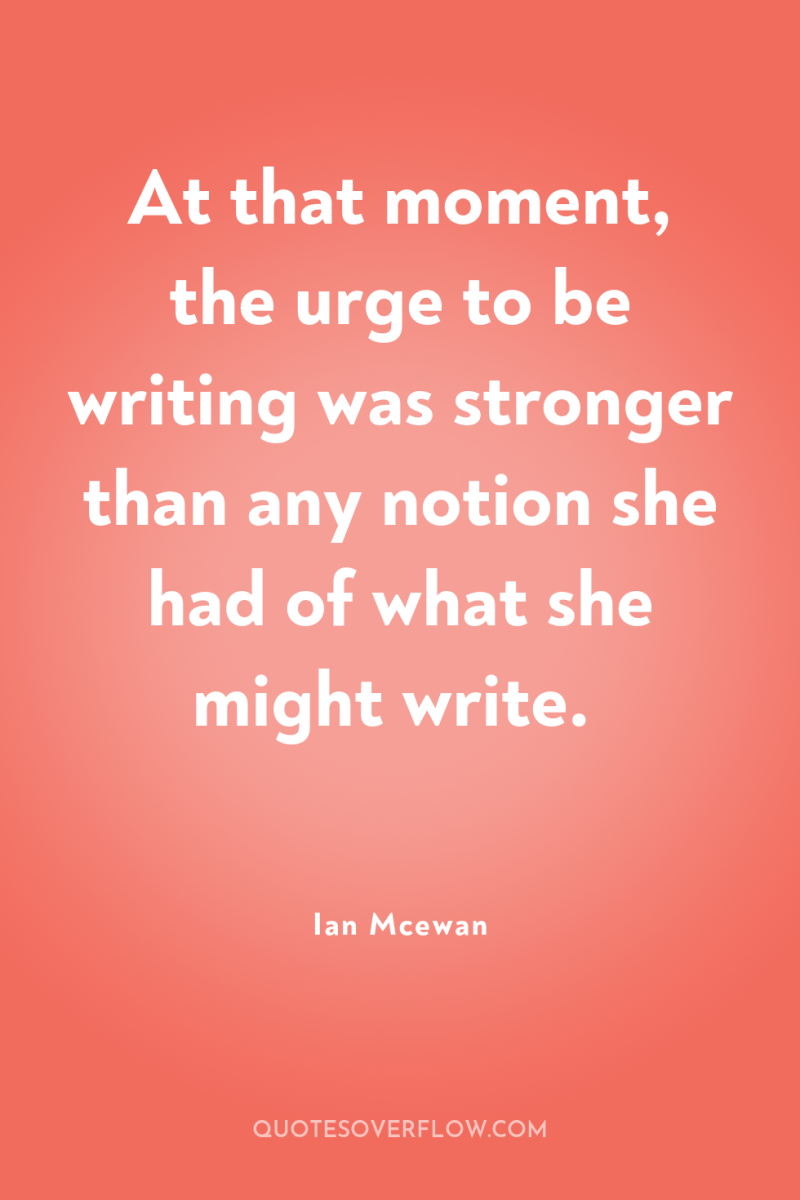
17
At that moment, the urge to be writing was stronger than any notion she had of what she might write.Ian Mcewan
18
The childhood of a spoiled prince could be framed within half a page, a moonlit dash through sleepy villages was one rhythmically emphatic sentence, falling in love could be achieved in a single word - a glance. The pages of a recently finished story seemed to vibrate in her hand with all the life they contained.Ian Mcewan
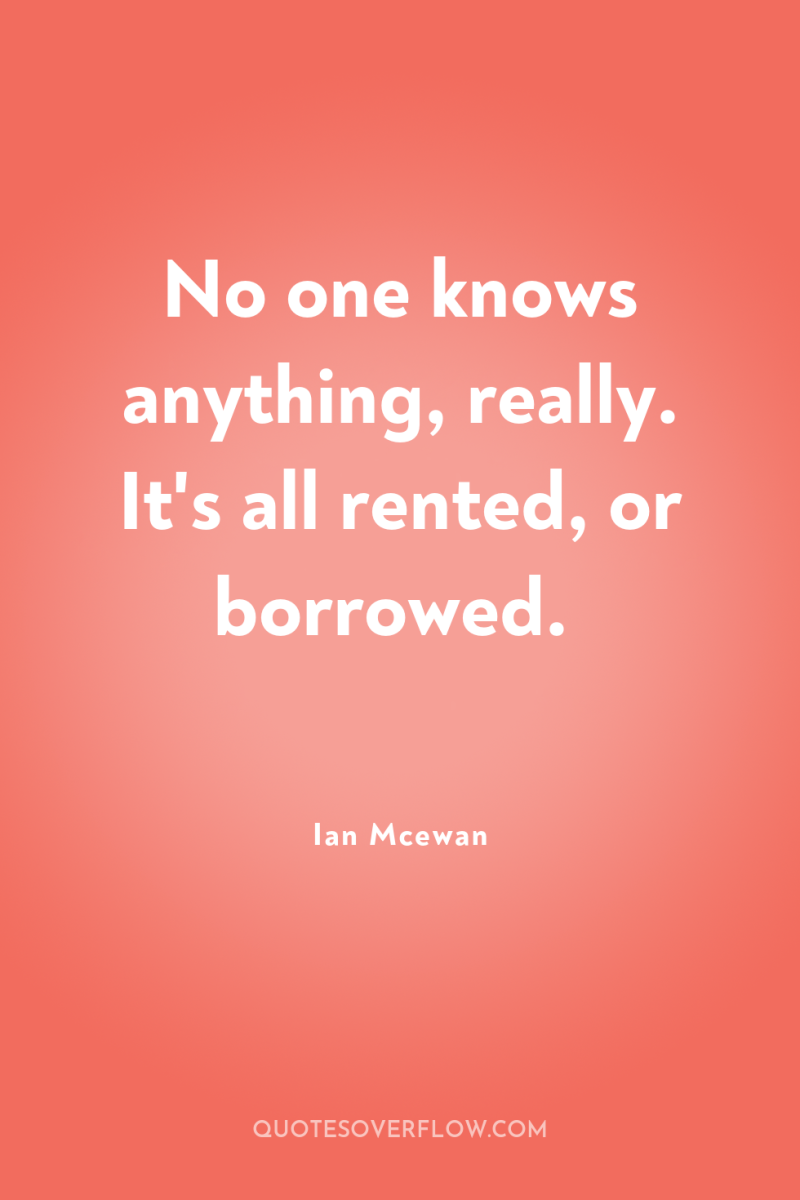
19
No one knows anything, really. It's all rented, or borrowed.Ian Mcewan
20
She had lolled about for three years at Girton with the kind of books she could equally have read at home-- Jane Austen, Dickens, Conrad, all in the library downstairs, in complete sets. How had that pursuit, reading the novels that others took as their leisure, let her think she was superior to anyone else?Ian Mcewan
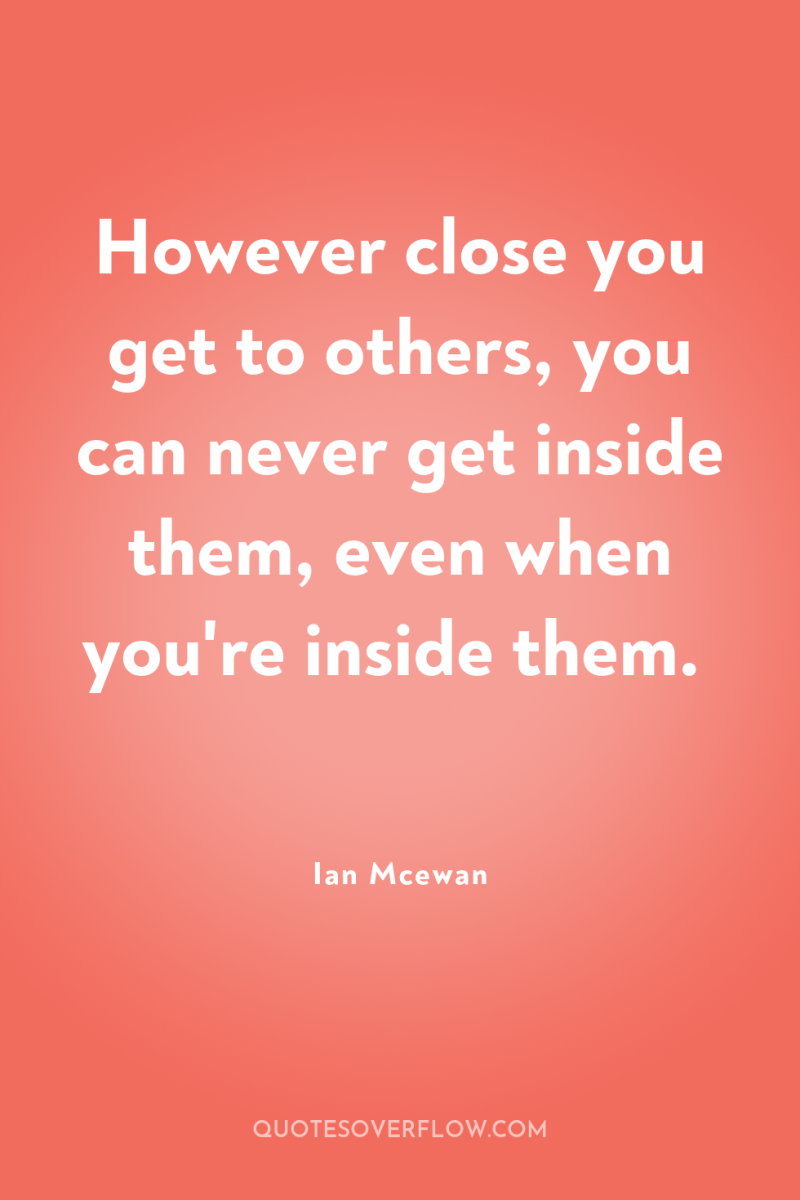
21
However close you get to others, you can never get inside them, even when you're inside them.Ian Mcewan
22
For children, childhood is timeless. It is always the present. Everything is in the present tense. Of course, they have memories. Of course, time shifts a little for them and Christmas comes round in the end. But they don’t feel it. Today is what they feel, and when they say ‘When I grow up, ’ there is always an edge of disbelief–how could they ever be other than what they are?Ian Mcewan
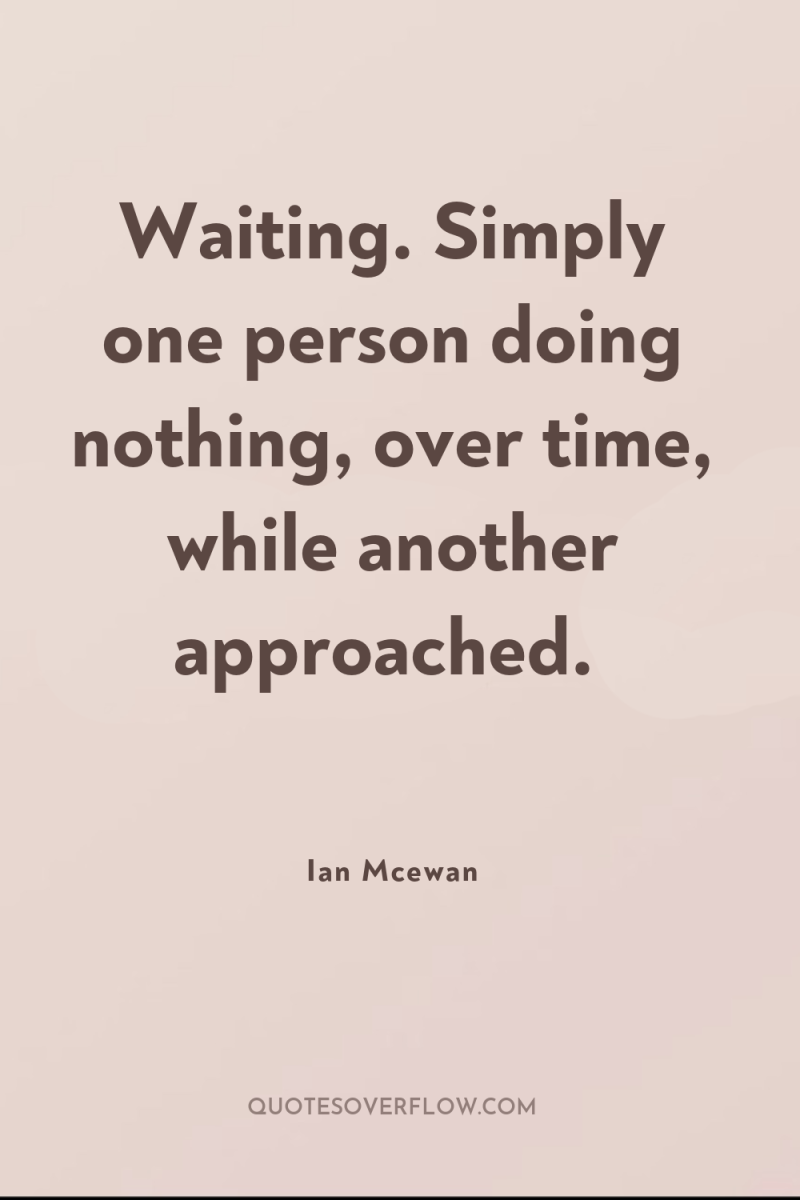
23
Waiting. Simply one person doing nothing, over time, while another approached.Ian Mcewan
24
He was thinking of that time, the way one does on long journeys when rootlessness and boredom, lack of sleep or routine can summon from out of nowhere random stretches of the past, make them as real as a haunting. --SolarIan Mcewan
25
At best he read popular science magazines like the Scientific American he had now, to keep himself up-to-date, in layman's terms, with physics generally. But even then his concentration was marred, for a lifetime's habit made him inconveniently watchful for his own name. He saw it as if in bold. It could leap out at him from an unread double page of small print, and sometimes he could sense it coming before the page turn. .Ian Mcewan
26
These memories sustained him, but not so easily. Too often they reminded him of where he was when he last summoned them. They lay on the far side of a great divide in time, as significant as B.C. and A.D. Before prison, before the war, before the sight of a corpse became a banality.Ian Mcewan
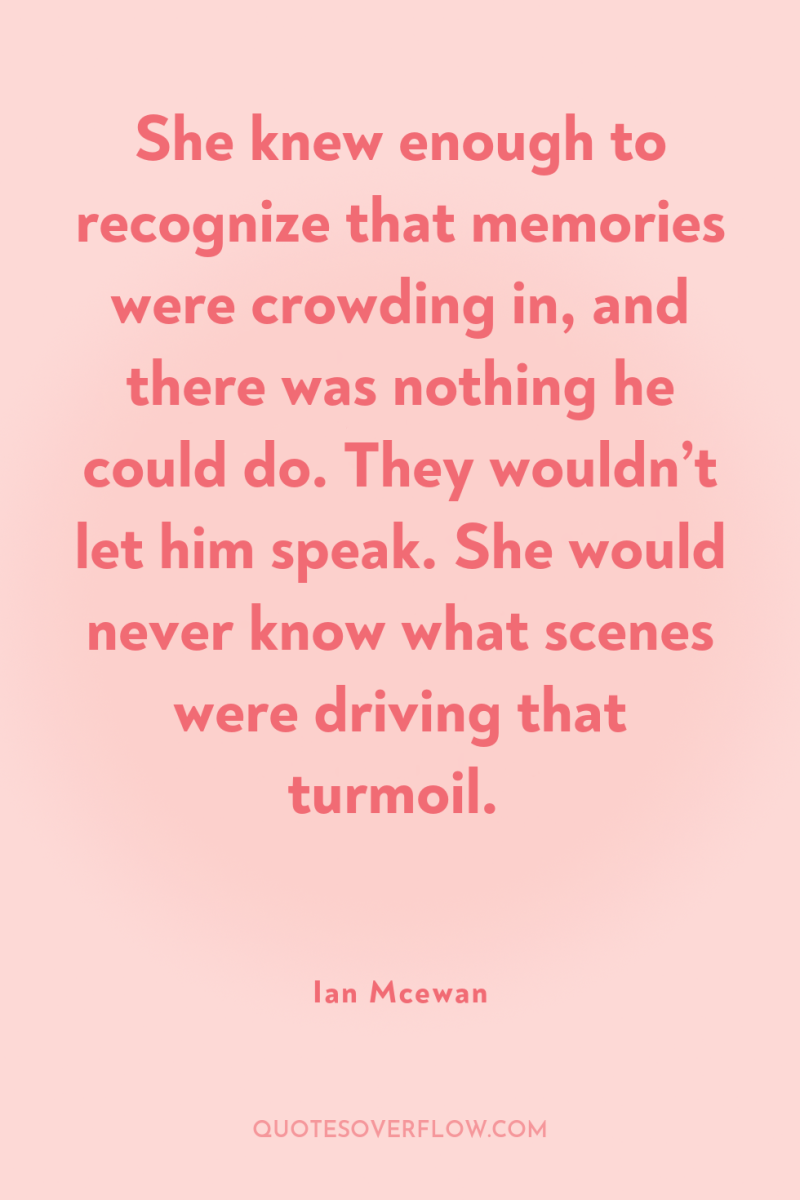
27
She knew enough to recognize that memories were crowding in, and there was nothing he could do. They wouldn’t let him speak. She would never know what scenes were driving that turmoil.Ian Mcewan
28
This was when he first suspected that the kindly child-loving God extolled by his headmistress might not exist. As it turned out, most major world events suggested the same. But for Theo’s sincerely godless generation, the question hasn’t come up. No one in his bright, plate-glass, forward-looking school ever asked him to pray, or sing an impenetrable cheery hymn. There’s no entity for him to doubt. His initiation, in front of the TV, before the dissolving towers, was intense but he adapted quickly. These days he scans the papers for fresh developments the way he might a listings magazine. As long as there’s nothing new, his mind is free. International terror, security cordons, preparations for war – these represent the steady state, the weather. Emerging into adult consciousness, this is the world he finds. .Ian Mcewan
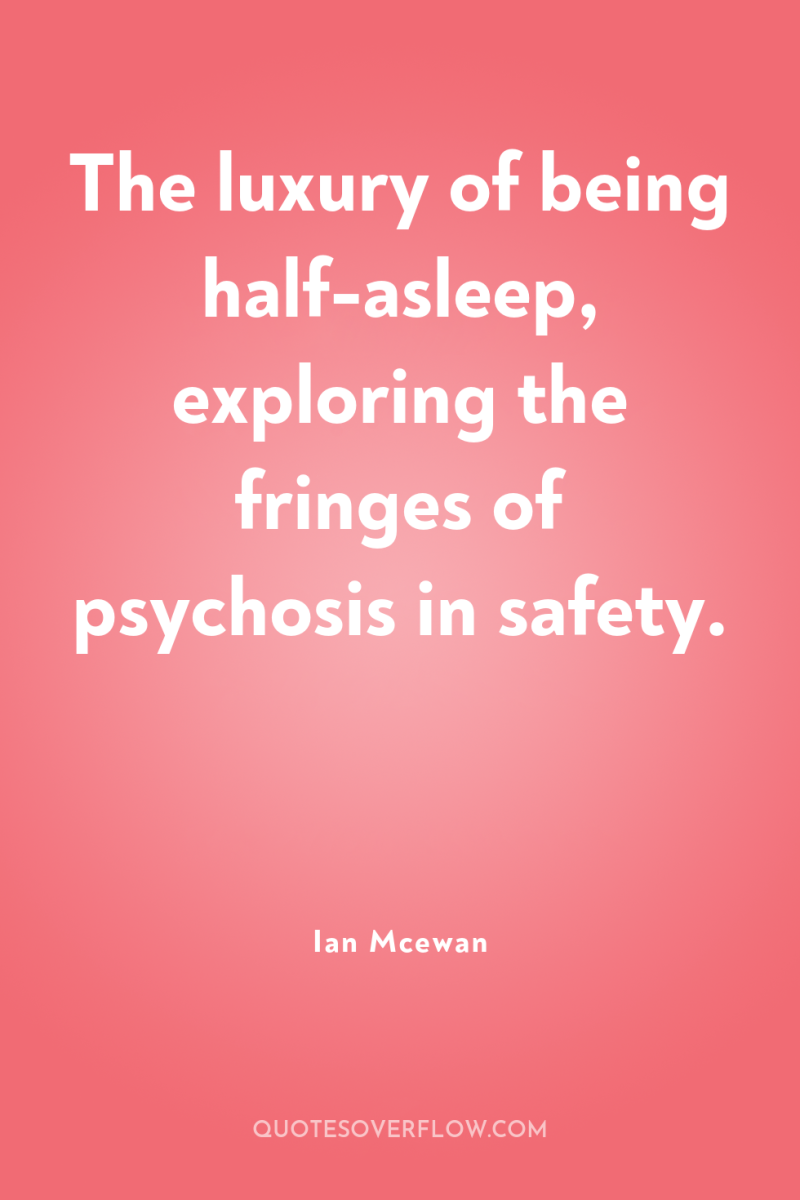
29
The luxury of being half-asleep, exploring the fringes of psychosis in safety.Ian Mcewan
30
I've heard it argued that long ago pain begat consciousness... Adversity forced awareness on us, and it works, it bites us when we go too near the fire, when we love too hard. Those felt sensations are the beginning of the invention of the self... God said, Let there be pain. And there was poetry. Eventually.Ian Mcewan
31
Adversity forced awareness on us, and it works, it bites us when we go too near the fire, when we love too hard. Those felt sensations are the beginning of the invention of the self. And if that works, why not feeling disgust for shit, fearing the cliff edge and strangers, remembering insults and favours, liking sex and food? God said, Let there be pain. And there was poetry. Eventually.Ian Mcewan
32
When he thought of her, it rather amazed him, that he had let that girl with her violin go. Now, of course, he saw that her self-effacing proposal was quite irrelevant. All she had needed was the certainty of his love, and his reassurance that there was no hurry when a lifetime lay ahead of them. Love and patience- if only he had had them both at once- would surely have seen them both through.Ian Mcewan
33
When love dies and marriage lies in ruins, the first casualty is honest memory, decent, impartial recall of the past. Too inconvenient, too damning of the present. It's the spectre of old happiness at the feast of failure and desolation. So, against that headwind of forgetfulness I want to place my little candle of truth and see how far it throws its light.Ian Mcewan
34
When she found a place of her ownand packed her bags he asked her to marry him. She kissed him, and quoted in his ear, " He married a woman to stop her getting away, Now she’s there all day.Ian Mcewan
35
Clive was losing sensation in his feet, and as he stamped them the rhythm gave him back the ten note falling figure, ritardando, a cor anglais, and rising softly against it, contrapuntally, cellos in mirror image. Her face in it. The end.Ian Mcewan
36
Dearest Cecilia, You’d be forgiven for thinking me mad, the way I acted this afternoon. The truth is I feel rather light headed and foolish in your presence, Cee, and I don’t think I can blame the heat.Ian Mcewan
37
Either I've always spoken to her from the heart in times like this, or I never have and I don't know what it means.Ian Mcewan
38
She had not thought it would be so easy to slip into the old roles. Cambridge had changed her fundamentally and she thought she was immune. No one in her family, however, noticed the transformation in her, and she was not able to resist the power of their habitual expectations.Ian Mcewan
39
When the wounded were screaming, you dreamed of sharing a little house somewhere, of an ordinary life, of a family line, connection. All around him, men were walking silently with their thoughts, reforming their lives, making resolutions. If I ever get out of this lot... They could never be counted, the dreamed-up children, mentally conceived on the walk into Dunkirk, and later made flesh.Ian Mcewan
40
They were beyond the present, outside time, with no memories and no future. There was nothing but obliterating sensation, thrilling and swelling, and the sound of fabric on fabric and skin on fabric as their limbs slid across each other in this restless, sensuous wrestling.. They moved closer, deeper and then, for seconds on end, everything stopped. Instead of an ecstatic frenzy, there was stillness. They were stilled not by the astonishing fact of arrival, but by an awed sense of return - they were face to face in the gloom, staring into what little they could see of each other's eyes, and now it was the impersonal that dropped away.Ian Mcewan
41
Sex is a different medium, refracting time and sense, a biological hyperspace as remote from conscious existence as dreams, or as water is from airIan Mcewan
42
But soon I loved her completely and wished to possess her, own her, absorb her, eat her. I wanted her in my arms and in my bed, I longed she would open her legs to meIan Mcewan
43
Her purity of spirit would never be in doubt, though she moved through a blemished world.Ian Mcewan
44
...children are at heart selfish, and reasonably so, for they are programmed for survival.Ian Mcewan
45
I've never outgrown that feeling of mild pride, of acceptance, when children take your hand.Ian Mcewan
46
I craved a form of naive realism. I paid special attention, I craned my readerly neck whenever a London street I knew was mentioned, or a style of frock, a real public person, even a make of car. Then, I thought, I had a measure, I could guage the quality of the writing by its accuracy, by the extent to which it aligned with my own impressions, or improved upon them. I was fortunate that most English writing of the time was in the form of undemanding social documentary. I wasn't impressed by those writers (they were spread between South and North America) who infiltrated their own pages as part of the cast, determined to remind poor reader that all the characters and even they themselves were pure inventions and the there was a difference between fiction and life. Or, to the contrary, to insist that life was a fiction anyway. Only writers, I thought, were ever in danger of confusing the two. .Ian Mcewan
47
It's a matter of dishonour, and when it gets out, which it's bound to, this will be the one act you'll be remembered for. Everything else you achieved will be irrelevant. Your reputation will rest only on this, because ultimately reality is social, it's among others that we have to live and their judgements matter. - Pg. 198Ian Mcewan
48
I'm sorry to disappoint you, but my experience belongs to me, not the collective bloody unconscious.Ian Mcewan
49
I was irritated by the way he conflated his own shifting needs with an impersonal destiny. I want it, therefore...it's in the stars!Ian Mcewan
50
The Anglican service today was more familiar to me from movies. Like one of the great Shakespeare speeches, the graveside oration, studded in fragments in the memory, was a succession of brilliant phrases, book titles, dying cadences that breathed life, pure alertness, along the spine.Ian Mcewan
51
…the way people understood things had a lot to do with the way people were, how they had been shaped, what the wanted; tricks of rhetoric would not shift them.Ian Mcewan
52
You can tell a lot from a person's nails. When a life starts to unravel, they're among the first to go.Ian Mcewan
53
Both men accepted that the nature of the request, its intimacy and self-conscious reflection on their friendship, had created, for the moment, an uncomfortable emotional proximity which was best dealt with by their parting without another word.Ian Mcewan
54
He wanted a father, and for the same reason, he wanted to be a father.Ian Mcewan
55
There's pathos in this familiar routine, in the sounds of homely objects touching surfaces. And in the little sigh she makes when she turns or slightly bends our unwieldy form. It's already clear to me how much of life is forgotten even as it happens. Most of it. The unregarded present spooling away from us, the soft tumble of unremarkable thoughts, the long-neglected miracle of existence. When she's no longer twenty-eight and pregnant and beautiful, or even free, she won't remember the way she set down the spoon and the sound it made on slate, the frock she wore today, the touch of her sandal's thong between her toes, the summer's warmth, the white noise of the city beyond the house walls, a short burst of birdsong by a closed window. All gone, already. .Ian Mcewan
56
Memory's got nothing to do with years. You remember what you remember.Ian Mcewan
57
Was everyone else really as alive as she was?... If the answer was yes, then the world, the social world, was unbearably complicated, with two billion voices, and everyone’s thoughts striving in equal importance and everyone’s claim on life as intense, and everyone thinking they were unique, when no one was. One could drown in irrelevance.Ian Mcewan
58
I felt stifled. Everything I looked at reminded me of myself.Ian Mcewan
59
He came to find her, wanting what everyone wanted, and what only free-thinking people, not the supernatural, could give. Meaning.Ian Mcewan
60
Perhaps I'd been a slow developer, but I was well into my forties before I realized that you don't have to comply with a request just because it's reasonable or reasonably put. Age is the great dis-obliger. You can be yourself and say no.Ian Mcewan
61
Writers owed their readers a duty of care, of mercy.Ian Mcewan
62
There was, in my view, an unwritten contract with the reader that the writer must honour. No single element of an imagined world or any of its characters should be allowed to dissolve on an authorial whim. The invented had to be as solid and as self-consistent as the actual. This was a contract founded on mutual trust.Ian Mcewan
63
It troubles him to consider the powerful currents and fine-tuning that alter fate, the close and distant influences, the accidents of character and circumstance.Ian Mcewan
64
In a language as idiomatically stressed as English, opportunities for misreadings are bound to arise. By a mere backward movement of stress, a verb can become a noun, an act a thing. To refuse, to insist on saying no to what you believe is wrong, becomes at a stroke refuse, an insurmountable pile of garbage.Ian Mcewan
65
In that shrinking moment he discovered that he had never hated anyone until now. It was a feeling as pure as love, but dispassionate and icily rational.Ian Mcewan
66
She knew very well that people fell out, even stormily, and then made up. But she did not know how to start - she simply did not have the trick of it, the row that cleared the air, and could never quite believe that hard words could be unsaid or forgotten.Ian Mcewan
67
The library door was thick and none of the ordinary sounds that might have reminded them, might have held them back, could reach them. They were beyond the present, outside time, with no memories and no future,Ian Mcewan
68
In difficult moments it’s sometimes a good idea to ask yourself what it is you most want to be doing and consider how it can be achieved. If it can’t, move on to the second best thing.Ian Mcewan
69
...I experienced a sudden ache -- part desolation, part panic -- to observe the speed with which this mate, this familiar, was transforming herself into a separate person.Ian Mcewan
70
Where the human need for order meetsthe human tendency to mayhem, where civilization runs smack against its discontents, you find friction, and a great deal of general wear and tear.Ian Mcewan
71
So here I am, upside down in a woman.Ian Mcewan
72
It wasn't torpor that kept her - she was often restless to the point of irritability. She simply liked to feel that she was prevented from leaving, that she was needed.Ian Mcewan
73
He had never before felt so self-consciously young, nor experienced such appetite, such impatience for the story to begin.Ian Mcewan
74
It was always the view of my parents, " Emily said, "that hot weather encouraged loose morals among young people.Ian Mcewan
75
But when I was an energetic self-important 10-year-old and found myself in a roomful of grownups, I felt guilty, and thought it only polite to conceal the fun I was having elsewhere. When an aged figure addressed me — they were all aged — I worried that what showed in my face was pity.Ian Mcewan
76
The constrained lives of his characters made me wonder how my own existence might appear in his hands.Ian Mcewan
77
All day we've witnessed each other's crimes. You killed no one today? But how many did you leave to die?Ian Mcewan
78
Growing up in a cathedral precinct, what did I know of the absurdities of communism, of how brave man and women in bleak and remote penal colonies were reduced to thinking day by day of nothing else beyond their own survival?Ian Mcewan
79
Jokes against the legal profession were what the legal profession loved most.Ian Mcewan
80
Only when you are grown up, perhaps only when you have children yourself, do you fully understand that your own parents had a full and intricate existence before you were born.Ian Mcewan
81
The light of artistic creation is also blinding. The artist can’t see the suffering he causesto those around him. And the’ll neverunderstand the purity of his goal, how the heatof his invention won’t melt the ice in his heart. He must be ruthless! No religion, no purpose except this: Make something perfect before you die. Life is short, art is for all timeIan Mcewan
82
In some respect Journalism is like science, the best ideas were one that survived and strengthened by opposition.Ian Mcewan
83
But this inglorious revolution wasn't for me. I didn't want a sex shop in every town.Ian Mcewan
84
She raised one hand and flexed its fingers and wondered, as she had sometimes before, how this thing, this machine for gripping, this fleshy spider on the end of her arm, came to be hers, entirely at her command. Or did it have some little life of its own? She bent her finger and straightened it. The mystery was in the instant before it moved, the dividing moment between not moving and moving, when her intention took effect. It was like a wave breaking. If she could only find herself at the crest, she thought, she might find the secret of herself, that part of her that was really in charge.Ian Mcewan
85
She bent her finger and straightened it. The mystery was in the instant before it moved, the dividing moment between not moving and moving, when her intention took effect. It was like a wave breaking. If she could only find herself at the crest, she thought, she might find the secret of herself, that part of her that was really in charge.Ian Mcewan
86
These clever, amoral, inventive, destructive men, single-minded, selfish, emotionally cool, coolly attractive. I think I preferred them to the love of Jesus. They were so necessary, and not only to me. Without them we would still be living in mud huts, waiting to invent the wheel.Ian Mcewan
87
It is quite impossible these days to assume anything about people's educational level from the way they talk or dress or from their taste in music. Safest to treat everyone you meet as a distinguished intellectual.Ian Mcewan
88
Every secret of the body was rendered up--bone risen through flesh, sacrilegious glimpses of an intestine or an optic nerve. From this new and intimate perspective, [Briony] learned a simple, obvious thing she had always known, and everyone knew: that a person is, among all else, a material thing, easily torn, not easily mended.Ian Mcewan
89
It can happen sometimes, with those who brood on an injustice, that a taste for revenge can usefully combine with a sense of obligation.Ian Mcewan
90
Revenge may be exacted a hundred times over in one sleepless night. The impulse, the dreaming intention, is human, normal, and we should forgive ourselves. But the raised hand, the actual violent enactment, is cursed. The maths says so. There’ll be no reversion to the status quo ante, no balm, no sweet relief, or none that lasts. Only a second crime. Before you embark on a journey of revenge, dig two graves, Confucius said. Revenge unstitches a civilisation. It’s a reversion to constant, visceral fear.Ian Mcewan
91
Before you embark on a journey of revenge, dig two graves, Confucius said. Revenge unstitches civilisation.Ian Mcewan
92
Now and then, an inch below the water's surface, the muscles of his stomach tightened involuntarily as he recalled another detail. A drop of water on her upper arm. Wet. An embroidered flower, a simple daisy, sewn between the cups of her bra. Her breasts wide apart and small. On her back, a mole half covered by a strap. When she climbed out of the pond a glimpse of the triangular darkness her knickers were supposed to conceal. Wet. He saw it, he made himself see it again. The way her pelvic bones stretched the material clear of the skin, the deep curve of her waist, her startling whiteness. When she reached for her skirt, a carelessly raised foot revealed a patch of soil on each pad of her sweetly diminished toes. Another mole the size of a farthing on her thigh and something purplish on her calf--a strawberry mark, a scar. Not blemishes. Adornments.Ian Mcewan
93
Especially difficult when the first and best unconscious move of a dedicated liar is to persuade himself he's sincere. And once he's sincere, all deception vanishes.Ian Mcewan
94
It's at moments like these in a game that the essentials of his character are exposed: narrow, ineffectual, stupid–and morally so. The game becomes an extended metaphor of character defect. Every error he makes is so profoundly, so irritatingly typical of himself, instantly familiar, like a signature, like a tissue scar or some deformation in a private place.Ian Mcewan
95
Becoming drunk is a journey that generally elates him in the early stages–he's good company, expansive, mischievous and fun, the famous old poet, almost as happy listening as talking. But once the destination is met, once established up there on that unsunny plateau, a fully qualified drunk, the nastier muses, the goblins of aggression, paranoia, self-pity take control. The expectation now is that an evening with John will go bad somehow, unless everyone around is prepared to toil at humouring and flattering and hours of frozen-faced listening. No one will be. .Ian Mcewan
96
Or he was simply pretending–like many drinkers, he liked to think each new day drew a line under the day before.Ian Mcewan
97
In the seventies I used to work in the bedroom of my flat at a little table. I worked in longhand with a fountain pen. I'd type out a draft, mark up the typescript, type it out again. Once I paid a professional to type a final draft, but I felt I was missing things I would have changed if I had done it myself. In the mid-eighties I was a grateful convert to computers. Word processing is more intimate, more like thinking itself. In retrospect, the typewriter seems a gross mechanical obstruction. I like the provisional nature of unprinted material held in the computer's memory - like an unspoken thought. I like the way sentences or passages can be endlessly reworked, and the way this faithful machine remembers all your little jottings and messages to yourself. Until, of course, it sulks and crashes. .Ian Mcewan
98
You pull a book from the shelf and there was an invention.. Almost like cooking, I thought sleepily. Instead of heat transforming the ingredients, there's pure invention, the spark, the hidden element. What resulted was more than the sum of parts.. At one level it was obvious enough how these separarte parts were tipped in and deployed. The mystery was in how they were blended into somthing cohesive and plausible, how the ingredients were cooked into something so delicious. As my thought scattered and I drifted toward the borders of oblivion, I thought I almost understood how it was done. .Ian Mcewan
99
How quickly the dead faded into each other,Ian Mcewan
100
While my friends struggled and calculated, I reached a solution by a set of floating steps that were partly visual, partly just a feeling for what was right. It was hard to explain how I knew what I knew.Ian Mcewan